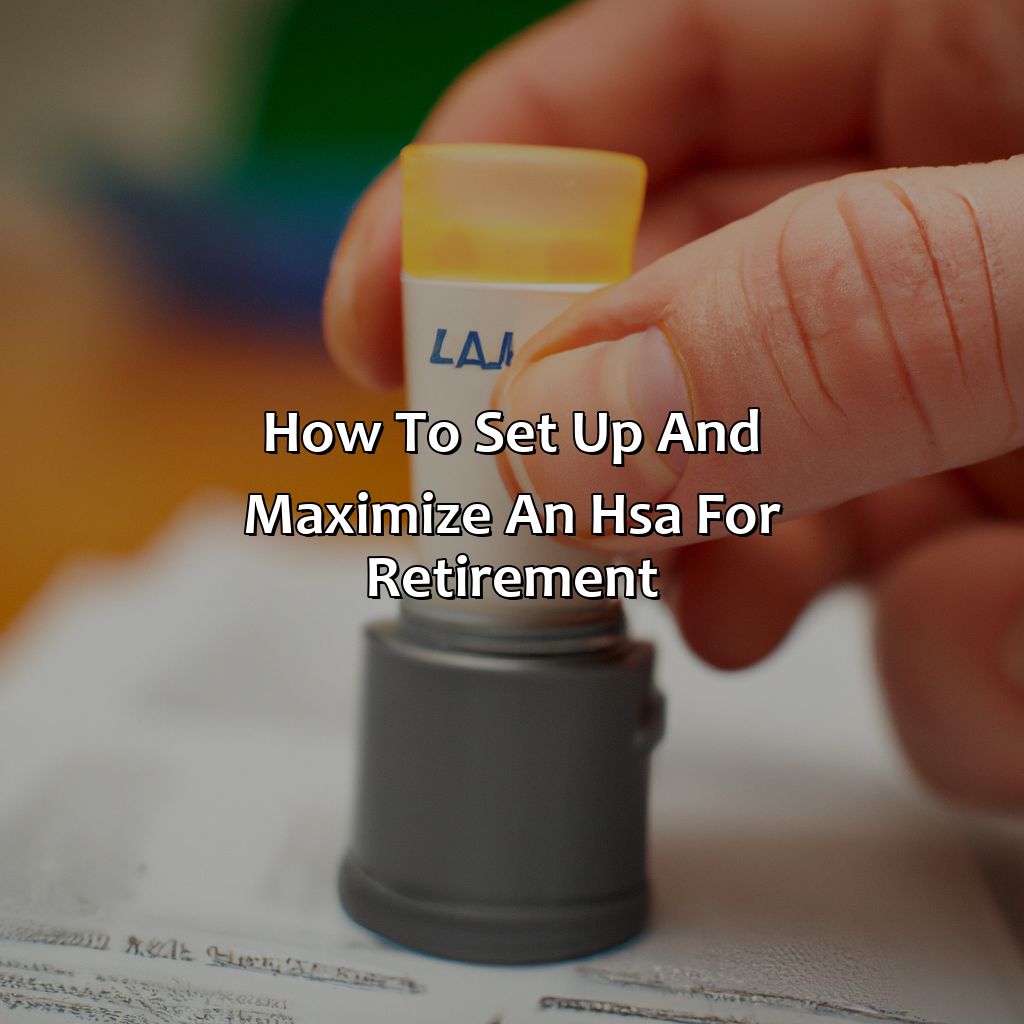Why Might A Health Savings Account (Hsa) Be Particularly Attractive As Part Of A Retirement Plan?
Key Takeaway:
- A Health Savings Account (HSA) can provide tax advantages as part of a retirement plan, as contributions are tax-deductible and withdrawals for qualified healthcare expenses are tax-free.
- An HSA also allows for long-term savings, as funds can be invested and carried over into retirement. It also provides flexibility in healthcare spending, as funds can be used for a variety of medical expenses, including Medicare premiums.
- To set up and maximize an HSA for retirement, it is important to understand eligibility and contribution limits, choose the right HSA provider, and consider investment options within the account.
Are you looking for an alternative retirement plan? A Health Savings Account (HSA) might be the solution you need. This article looks into why an HSA could be particularly attractive and how it can benefit your retirement plan. You’ll gain insight into how to maximize the potential of this account.
Benefits of Health Savings Account (HSA) in Retirement Plan
Reap the full perks of a Health Savings Account (HSA) and use it as your retirement plan! Know its advantages, such as tax breaks. Build up your long-term savings and have the flexibility to spend on healthcare needs.
Let’s take a closer look at these benefits.
Tax Advantages of HSA
Health Savings Accounts (HSAs) offer significant tax advantages that make them an attractive addition to retirement plans. By making contributions on a pre-tax basis, individuals can reduce their taxable income while also saving for medical expenses in retirement. Withdrawals for qualified healthcare expenses are tax-free, and any unused funds can be rolled over from year to year. Additionally, funds in an HSA can grow tax-free if invested wisely, further increasing the potential benefits of using an HSA as part of a retirement plan.
One unique advantage of HSAs is their triple tax benefit: contributions are tax-deductible, earnings grow tax-free, and withdrawals for qualified medical expenses are also tax-free. This makes them more advantageous than other savings accounts and investment vehicles that only offer one or two of these benefits.
Some people may not realize that they can continue to contribute to their HSA even after they retire as long as they still have a qualifying high-deductible health plan. This allows for continued growth and use of the account as a vital part of healthcare funding in retirement.
In one example, a retired couple was able to use the funds saved in their HSA to pay for various healthcare expenses during their golden years. By carefully managing their withdrawals from the account and investing wisely, they were able to offset significant healthcare costs without dipping into their other savings or relying solely on Medicare coverage. The couple noted that having the HSA truly helped ease some of the financial stress associated with aging and maintaining good health.
You might not be able to avoid aging, but with a Health Savings Account, you can at least avoid bankrupting yourself in the process.
Long-Term Savings with HSA
As a retirement plan, an HSA can provide long-term savings that grow tax-free. This type of account allows individuals to contribute pre-tax dollars and earn tax-free interest on their balance, which can be used for qualified medical expenses.
Not only does the money in an HSA roll over from year to year, but its investment options enable contributions to grow even more over time. In addition, unlike other retirement accounts, there are no required minimum distributions from HSAs at age 72.
One unique benefit of using an HSA as part of a retirement plan is that any funds left over after age 65 can be withdrawn penalty-free for non-medical purposes (only income taxes apply). This means that even if an individual remains healthy throughout retirement and has minimal medical expenses, the funds in their HSA can still be utilized without penalty.
A retired individual shared they began contributing to an HSA early on and accumulated a significant amount over time. They were able to use the funds for both immediate medical expenses and long-term health care costs during retirement. The tax-free growth of the HSA made it an attractive option for saving towards healthcare expenses later in life.
Who needs a genie in a bottle when you’ve got the flexibility of a Health Savings Account for all your healthcare spending needs?
Flexibility in Healthcare Spending
With a Health Savings Account (HSA) as part of your retirement plan, you have the freedom to use it for healthcare expenses. You can also distribute your funds and investments among your beneficiaries after you’ve passed away. HSA accounts allow for flexibility in healthcare spending, enabling you to use the funds without paying taxes on them.
In summary, HSAs can enhance your retirement plans by offering you more control over healthcare expenses in addition to being an investment option. This account comes with significant tax benefits and an increased potential for growth.
According to Investopedia, “HSAs are one of the most tax-advantaged accounts available.”
If you’re looking to set up an HSA for retirement, just remember, the more you save on medical expenses, the more you can spend on avocado toast in your golden years.
How to Set Up and Maximize an HSA for Retirement
- Maximize your HSA for retirement! Get to know eligibility and contribution limits.
- Pick the perfect HSA provider.
- Invest in options within your HSA. This will guarantee you use this one-of-a-kind retirement planning tool to its full potential.

Image credits: retiregenz.com by James Duncun
Eligibility and Contribution Limits
To determine if you are eligible to contribute to an HSA, and how much you can contribute, it is important to understand the guidelines surrounding this type of account. Contribution amounts are determined by factors such as age, plan type, and coverage status.
The following table provides the Eligibility and Contribution Limits for HSA:
| Individual Coverage | Family Coverage | |
|---|---|---|
| Minimum Deductible | $1,400 | $2,800 |
| Maximum Out-of-Pocket Expense | $6,900 | $13,800 |
| Annual Contribution Limit | $3,600 | $7,200 |
| Catch-Up Contribution (55 or older) | +$1,000 | +$1,000 |
It is important to note that contribution limits can increase annually due to cost-of-living adjustments. Additionally, those who are eligible for Medicare cannot make contributions to their HSA.
HSA contributions are tax-deductible and withdrawals used for qualified medical expenses are tax-free. In fact, HSA funds can even be invested similar to a retirement account which could lead to substantial growth over time.
According to Forbes' article ‘An HSA May Be Your Best Retirement Savings Tool’, “HSAs allow individuals of all ages to save on a tax-advantaged basis for qualified medical expenses in retirement”.
Looking for the right HSA provider is like finding a needle in a haystack, except the needle has a maximum contribution limit and tax advantages.
Choosing the Right HSA Provider
When selecting the Best HSA Provider, it’s essential to consider several factors. Doing so guarantees you choose a provider that matches your requirements and helps maximize the investment returns.
- Assess the Fees – look for a provider who offers low or no fees for transactions and balances.
- Credit Card Fees – check if they have minimal fees or rewards linked with credit card usage.
- Investment Options – see what investing options you have access to through the provider.
- Customer Service – research how efficient their customer service is and what channels of communication they support.
- Online Management Tools – see if they offer online tools that make managing your account easy, convenient, and user-friendly.
- Funding Options – check if there are various funding options such as linking your checking account or debit card to your HSA account.
It’s also vital to note that while pricing plays an important role in determining the right HSA Provider, other specialized attributes also matter. These include additional features like signing bonuses, interest earned, referral programs, among others.
Pro Tip: Go for an independent point of view by checking out reviews and recommendations from industry-specific sites to verify the suitability of a potential HSA Provider.
Make your HSA work for you and your future by exploring the investment options within it – after all, it’s not just for Band-Aids and Advil anymore.
Investment Options within HSA
HSAs offer various means to invest funds that accumulate over time. Explore investment options within HSA:
The following table presents investment options for HSAs, including investing in stocks, mutual funds, and bonds. Note that the fees and minimum balance requirements vary by provider.
| Investment Options | Fees | Minimum Balance |
|---|---|---|
| Stocks | 1% | $1,000 |
| Mutual Funds | 0.5% | $500 |
| Bonds | 2% | $2,000 |
By choosing the appropriate investment strategy, one can further increase their overall savings from HSAs. Maximizing savings from an HSA procures more benefits using the triple tax advantage structure offered through it.
Some HSAs also provide Automated Investment Choices. Reason effectively on how these work well with a retirement plan particularly when individuals are constantly on-the-go.
It’s noteworthy that some providers offer limited investment choices or charge high fees for investing; therefore, careful examination of providers is critical before deciding where to open an HSA account. Historical data show that proper use of an HSA for retirement can produce significant savings compared to other retirement plans while also providing several advantages not offered elsewhere.
The only thing worse than not having an HSA in your retirement plan is using it all up on fancy healthcare products from Skymall.
Risks and Limitations of HSA in Retirement Plan
To understand HSA in Retirement Plans better, let’s look at the Risks and Limitations. High Deductibles, Out-of-Pocket Costs, and Rules and Regulations on Withdrawals should be considered. This will help you learn how HSA works and how it impacts your retirement savings.

Image credits: retiregenz.com by David Washington
High Deductibles and Out-of-Pocket Costs
Healthcare expenses can be significantly high, and healthcare coverage can help cover these costs. However, High Deductibles and Out-of-Pocket Costs in health care plans are a common barrier for many people. The cost-sharing model implies that the insured person must pay part of the healthcare costs out of pocket. This structure means that many individuals require other avenues to support their healthcare expenses.
With the increasing popularity of Health Savings Accounts (HSA), this gap may become transformed due to the triple tax benefit it provides. HSA offers attractive benefits both as a short-term health insurance plan and long-term savings accounts for retirements. The money saved in an HSA account is tax-exempt, and the contributions reduce one’s total taxable income.
Although HSAs offer numerous advantages, there are some limitations too. One critical limitation is that they require a high-deductible health insurance plan which means higher out-of-pocket expenses when you receive medical services or treatments not covered by the health plan until you reach your deductible amount set in the HDHP.
Therefore, before opening an HSA account, it’s essential to evaluate whether one can afford both high deductibles and out-of-pocket expenses required by HDHPs if you need more extensive medical treatment not covered by a health plan.
To make HSA work better as part of retirement planning, one suggestion is maximizing contributions every year to grow funds over time for later use during retirement. Another recommendation is keeping or investing unused balances into profitable investments portfolios such as stocks or bonds to earn compound interest that yield a considerable return-on-investment(ROI).
Why not just let us use our HSA money to buy a yacht and sail into retirement? Oh right, rules and regulations.
Rules and Regulations on HSA Withdrawals in Retirement
In retirement, HSA withdrawals must adhere to specific guidelines and limitations. Contributions made before age 65 can only be withdrawn penalty-free for qualified medical expenses. After age 65, non-medical withdrawals are subject to taxes but not penalties. However, it is important to note that HSA funds used for Medicare premiums are not considered qualified medical expenses.
It is advisable to keep track of receipts and reimbursements for medical expenses, as there is no time limit for reimbursement of qualified expenses from an HSA account. Additionally, contributions must cease once enrolled in Medicare Part A or B. Failure to cease contributions could result in tax penalties.
To make the most of an HSA in retirement, it is suggested that individuals maximize contributions before retirement age and allow the funds to grow tax-free by avoiding withdrawals until necessary. It may also be beneficial to consider investing unused funds in low-cost index funds or other investment vehicles offered by the HSA provider.
Overall, understanding the rules and regulations surrounding HSA withdrawals in retirement can help individuals make informed decisions about their healthcare costs and long-term financial planning needs.
Some Facts About Why Health Savings Accounts (HSAs) Are Attractive in Retirement:
- ✅ HSAs offer triple tax benefits: contributions are tax-deductible, earnings grow tax-free, and withdrawals for qualified medical expenses are tax-free. (Source: NerdWallet)
- ✅ HSAs have no minimum distribution requirements, making them ideal for long-term savings. (Source: Fidelity)
- ✅ HSAs can be used to pay for Medicare premiums, deductibles, and co-pays, as well as long-term care premiums. (Source: AARP)
- ✅ HSAs can be used to bridge the gap between retirement and Medicare eligibility, which starts at age 65. (Source: CNBC)
- ✅ HSAs can be passed on to heirs tax-free if used for qualified medical expenses. (Source: Investopedia)
FAQs about Why Might A Health Savings Account (Hsa) Be Particularly Attractive As Part Of A Retirement Plan?
Why might a health savings account (HSA) be particularly attractive as part of a retirement plan?
HSAs offer triple tax benefits: tax-deductible contributions, tax-free growth, and tax-free withdrawals for qualified medical expenses, making it an attractive option for retirement planning.
Can HSA funds be used for non-medical expenses?
Yes, but there will be tax implications. Withdrawals for non-medical expenses before age 65 will result in a 20% penalty in addition to regular income taxes. After age 65, withdrawals for non-medical expenses will be taxed as regular income.
What happens to unused HSA funds when I retire?
HSA funds rollover year after year and remain in the account even after you stop making contributions. When you reach age 65, you can use the funds for any purpose penalty-free, although they are still subject to income tax if not used for qualified medical expenses.
Can I contribute to an HSA after age 65?
No, you can no longer contribute to an HSA after you enroll in Medicare, but you can still use the funds in the account for qualified medical expenses tax-free.
How much can I contribute to an HSA?
For 2021, individuals can contribute up to $3,600 and families can contribute up to $7,200 to an HSA. If you are age 55 or older, you can contribute an additional $1,000 per year as a catch-up contribution.
Is an HSA always a good option for retirement planning?
It depends on your financial situation and medical needs. If you have a high-deductible health plan (HDHP) and can afford to make contributions to an HSA, it can be a great way to save for future medical expenses tax-free. However, if you have low medical expenses or do not have an HDHP, an HSA may not be the best option for you.




